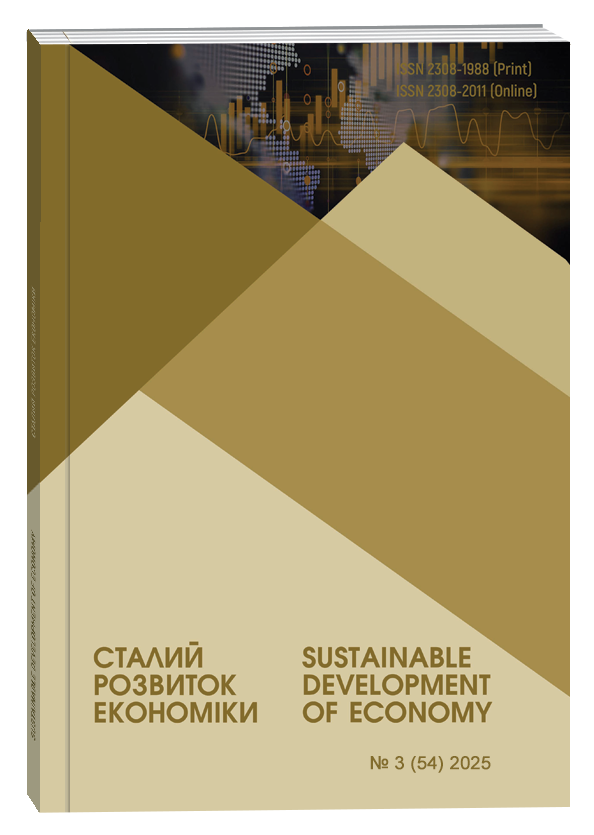ЦИФРОВІЗАЦІЯ ТА ТРАНСПАРЕНТНІСТЬ: ІННОВАЦІЙНА АКТИВНІСТЬ В МЕНЕДЖМЕНТІ ЛОГІСТИЧНОЇ ДІЯЛЬНОСТІ
Анотація
У статті обґрунтовано значення впровадження інноваційних цифрових технологій та автоматизації в логістичну сферу. Зазначено, що використання новітніх технологічних рішень сприяє підвищенню продуктивності та зменшенню витрат, особливо завдяки цифровізації процесів на складах і в транспортній логістиці. Проаналізовано наявні виклики, серед яких – значні витрати на впровадження сучасних технологій і нестача кваліфікованих кадрів. Окрему увагу приділено труднощам інтеграції нових рішень із вже наявною інфраструктурою, що створює додаткові бар’єри для малого та середнього бізнесу. Визначено практичні поради щодо підвищення якості логістичних процесів, що підсилює прикладну цінність дослідження. Обґрунтовано, що одним із чинників підвищення ефективності логістичної діяльності є транспарентність. У підсумку наголошується на потребі формування цифрової моделі логістичної діяльності, яка поєднуватиме логістичні принципи з інноваційними підходами до ведення бізнесу. Завдяки цифровізації компанії зможуть підвищити ефективність ведення бізнесу шляхом автоматизації і оптимізації процесів та підвищити його конкурентоспроможність.
Посилання
Agatic, A., Jugovic, T. Poletan, Tijan E., Jugovic, A. Digital business models in the logistics services. 43rd international convention on information, communication and electronic technology. MIPRO 2020, pp. 1416-1421.
Гуржій Н., Гавран В., Сапотніцька Н. Цифрові технології та їхній вплив на управління логістичними процесами підприємств. Економіка та суспільство. 2023, № 55. DOI: https://doi.org/10.32782/2524-0072/2023-55-20
Коляденко С., Голубкова І., Бабаченко М., Левинська Т., Бурмака Л. Розвиток та використання ІТ-рішень в логистиці. Financial and Credit Activity Problems of Theory and Practice, 3(34), С. 230-236.
Кудирко О. В. Автоматизація логістичних процесів як сучасний тренд. Сучасні технології комерційної діяльності і логістики: зб. матеріалів II Міжнар. наук.-практ. інтернет-конф., 3 листоп. 2022 р., Київ : КНЕУ. С. 56-59.
Лісіца В.В., Михайленко О.М., Ротенберг О.В. Цифрові ланцюги поставок: технології, тенденції та напрями розвитку. Причорноморські економічні студії. 2023. № 81. С. 99-106.
Maersk A.S. A.P. Moller - Maersk and IBM to discontinue TradeLens, a blockchain-enabled global trade platform. URL: https://www.maersk.com/news/articles/2022/11/29/maersk-and-ibm-to-discontinue-tradelens (дата звернення: 21.04.2025).
Михайлик Н.І. Основні виклики та перспективи розвитку транспортної логістики в умовах війни. The actual problems of regional economy development. 2024. Т. 1. №. 20. С. 163-172.
Yang Chung-Shan, Lin Moses Shang-Min. The impact of digitalization and digital logistics platform adoption on organizational performance in maritime logistics of Taiwan. Maritime policy & Management, 2023.Vol. 51, pp. 1884-1901.
Agatic, A., Jugovic, T. Poletan, Tijan E., & Jugovic, A. (2020). Digital business models in the logistics services. 43rd international convention on information, communication and electronic technology (MIPRO), рp. 1416-1421.
Hurzhii, N., Havran, V., Sapotnitska, N. (2023). Tsyfrovi tekhnolohii ta yikhnii vplyv na upravlinnia lohistychnymy protsesamy pidpryiemstv [Digital technologies and their impact on the management of logistics processes of enterprises]. Economy and society, Vol. 55. DOI: https://doi.org/10.32782/2524-0072/2023-55-20. (in Ukrainian)
Koliadenko, S., Holubkova, I., Babachenko, M., Levynska, T., Burmaka, L. (2020). Rozvytok ta vykorystannia it-rishen v lohystytsi [Development and use of IT solutions in logistics]. Financial and Credit Activity Problems of Theory and Practice. 3(34), pp. 230-236. (in Ukrainian)
Kudyrko O. V. (2022) Avtomatyzatsiia lohistychnykh protsesiv yak suchasnyi trend [Autoation of logistics processes as a modern trend]. Suchasni tekhnolohii komertsiinoi diialnosti i lohistyky: zb. materialiv II Mizhnar. nauk.-prakt. internet-konf., 3 lystop. 2022 r., Kyiv: KNEU, pp. 56-59. (in Ukrainian)
Lisitsa, V. V., Mykhaylenko, O. M., Rotenberh, O. V. (2023). Tsyfrovi lantsyuhy postavok: tekhnolohiyi, tendentsiyi ta napryamy rozvytku [Digital supply chains: technologies, trends and development directions. black sea economic studies]. Prychornomorsʹki ekonomichni studiyi, 81, pp. 99-106. (in Ukrainian)
Maersk A. S. (2022). Moller A. P. – Maersk and IBM to discontinue TradeLens, a blockchain-enabled global trade platform. Available at: https://www.maersk.com/news/articles/2022/11/29/maersk-and-ibm-to-discontinue-tradelens
Mykhailyk N. I. (2024) Osnovni vyklyky ta perspektyvy rozvytku transportnoi lohistyky v umovakh viiny [The main challenges and prospects for the development of transport logistics in the conditions of war]. The actual problems of regional economy development. Т. 1. №. 20, pp. 163-172. (in Ukrainian)
Yang Chung-Shan, & Lin Moses Shang-Min (2023). The impact of digitalization and digital logistics platform adoption on organizational performance in maritime logistics of Taiwan. Maritime policy & Management, Vol. 51(8), pp. 1884-1901.


